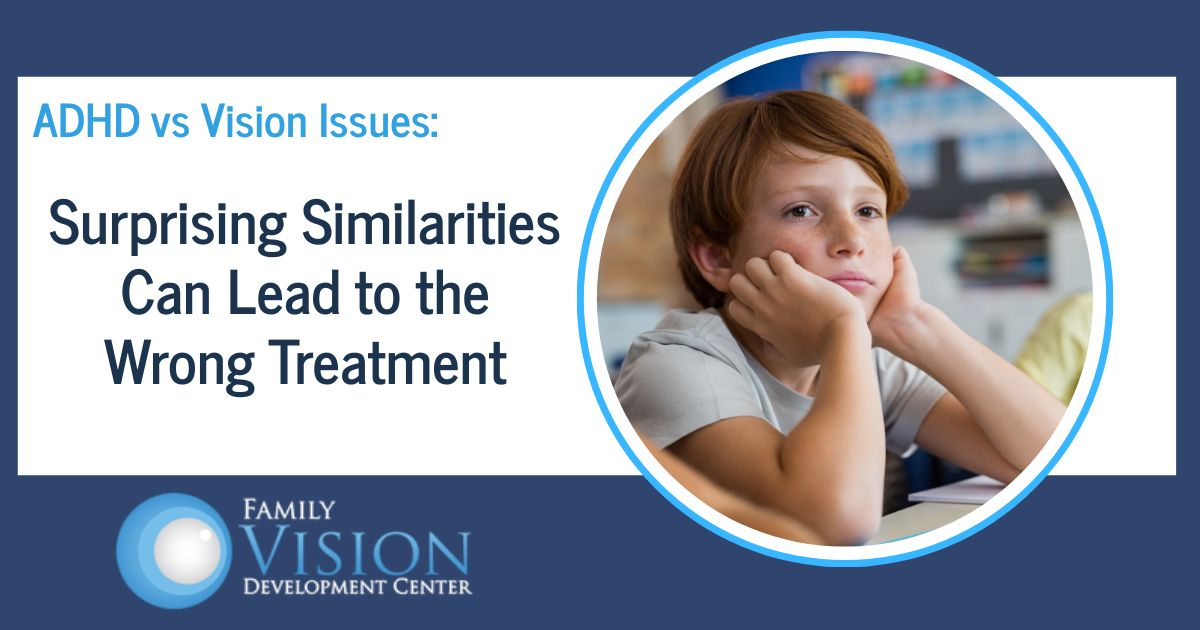October is ADHD Awareness Month, a time dedicated to spreading understanding and support for those living with attention-deficit/hyperactivity disorder. While ADHD is a well-recognized condition, what many people don’t realize is that certain vision problems can mimic ADHD symptoms, which can lead to confusion, misdiagnosis and delayed treatment.
Understanding the difference between vision issues and ADHD is essential when it comes to helping children succeed academically, socially, and emotionally.
Vision Conditions that are Similar to ADHD Symptoms
There are several vision conditions that look surprisingly similar to typical symptoms of ADHD, which can lead to an incorrect diagnosis.
- Focusing issues (accommodative dysfunction) – people with this condition have trouble maintaining clear focus on near objects. This can lead to headaches, eye strain, and fatigue, making sustained attention on tasks (especially reading or writing) incredibly difficult. A child who constantly loses their place or re-reads lines might be seen as inattentive, when it is actually a focusing issue causing the problem.
- Eye teaming issues (convergence insufficiency) – this affects how your eyes work together, and makes it difficult to turn your eyes inward together to see things up close. It results in double vision and words looking blurred on a page. This can make it very difficult to read, often needing to use a finger to keep track, ultimately resulting in tired eyes and seeming lack of concentration.
- Eye tracking issues – smooth and accurate eye movements are essential for reading. If the eyes struggle to move from word to word efficiently, a common result is skipping lines or losing your place. This can be mistaken for carelessness or inattention, when it’s actually a problem with the mechanics of eye movement.
- Nearsightedness, farsightedness or astigmatism (refractive errors) – these are more straightforward, but if they are not corrected properly it can cause eye discomfort, strain or fatigue that can make concentrating on visual tasks very difficult.
If a person is experiencing any of these vision conditions, they might exhibit symptoms that can be mistakenly diagnosed as ADHD, such as:
- Impulsiveness or short attention span
- Fidgeting or restlessness
- Avoiding close-up tasks like homework or classwork
- Poor academic performance
- Frequent frustration during tasks that require close-up work, like reading
Key Differences Between ADHD and Vision Problems
While the symptoms can overlap, there are certain differences and indicators that might suggest a vision problem rather than solely ADHD:
- Timing of symptoms – if symptoms primarily emerge during visual tasks like reading or computer work, but lessen during activities that don’t require much close-up vision, it could be a sign of a vision issue rather than ADHD
- Physical symptoms – Headaches, eye strain, rubbing eyes, blurry vision, double vision, sensitivity to light, or tilting the head to see better are strong indicators of a vision issue.
- Type of task – The type of task that a person is having difficulty with can provide a clue to the underlying cause. For example, struggling with tasks that require reading, while doing well with hands-on activities or those that involve listening might indicate a visual problem.
Generally, a person with ADHD will typically struggle with focus across many settings, whether it’s at school, home, or recreational activities. Someone with a vision problem often struggles most during visually demanding tasks, such as reading, copying from the board, or doing homework or computer work.
Getting an Accurate Diagnosis at Family Vision Development Center
Our team can play an essential role in discovering vision-related challenges that may be mistaken for ADHD. Our comprehensive vision exams test for issues like eye teaming and tracking, visual acuity at near and far distances, focusing ability and eye movement skills. If we diagnose a visual condition, we can opt for proper treatments, such as prescription lenses or vision therapy. Being able to identify visual issues early on can ensure that symptoms are corrected in the right way, even potentially sparing the unnecessary use of medications.
If you suspect ADHD or have received a diagnosis, it is important to explore every option to ensure that diagnosis is correct. Contact us at 630-862-2020 to schedule an appointment for a vision exam.
Family Vision Development Center is a full-service vision center offering innovative vision therapy services, sports vision therapy services, post-concussive vision rehabilitation, comprehensive vision exams for eyeglasses and contact lenses, management of ocular diseases including glaucoma, diabetes, macular degeneration and cataracts, and a state-of-the-art optical center offering the latest designs in eyewear.

